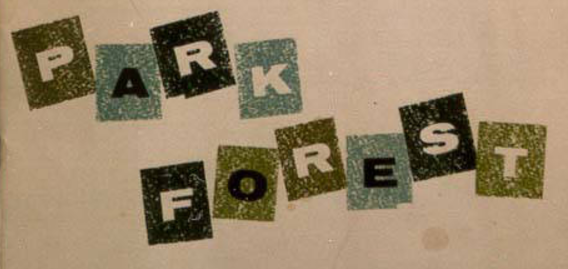
Park Forest began in 1946 as a dream held by Carroll F. Sweet, Sr., to build a "G.I. Town" for returning veterans. Due to the lack of building during the Depression and World War II, the returning veterans and their young families faced a severe housing shortage. Carroll F. Sweet, Sr., introduced Nathan Manilow, a Chicago builder to Philip M. Klutznick, who was working in Washington D.C. as head of the Federal Public Housing Authority. Both men thought the dream was worth bringing to reality. The result was the first post-World War II planned community to include a shopping center and all of the amenities of modern life built in to the original plan. The plan was turned in to FHA in November 1946. Move-ins began in August 1948. On February 1, 1949, at the suggestion of the builders, Park Forest was incorporated as a village. By October 1949, 3,010 rental units had been completed. Construction of "For Sale" homes was begun by 1950.
Much of the history of the housing developments in Chicago and its suburbs is that of housing segregation. Park Forest was a leader along with its southern sibling, Park Forest South (now University Park) and Oak Park, in adopting and implementing fair housing policies and pioneered successful racial integration.
This collection is a project of the Park Forest Historical Society Archives and the Governors State University Archives, posting digitized primary source materials from these two archives. Posting of these materials are for non-profit educational use only. Please contact Opus@govst.edu regarding publication rights.
Submissions from 1999
Park Forest African American Pioneers: When and How We Entered, 1958-1968, Jacqualine F. Scott, James Blackman, and Robert Thayer
Submissions from 1984
South Suburban Journal, June 1984, 1984-06-01, South Suburban Housing Center
South Suburban Journal, September 1984, 1984-09-01, South Suburban Housing Center
Submissions from 1981
Integration Maintenance Program Evaluation Part 1: Report of Findings for the Village of Park Forest, Illinois, Leonard F. Heumann, James L. Rose, Hildy L. Kingma, Joseph Gore, and Ann Campbell
Submissions from 1980
The Park Forest Home Maintenance Handbook, Dudley Onderdonk
Submissions from 1979
Affirmative Marketing Handbook: A Guide to Integrated Housing, Judy Wunker, Wilma Scott, Donald L. DeMarco, and Dudley Onderdonk
Submissions from 1977
Integration in Housing: A Plan for Racial Diversity, Dudley Onderdonk, Donald DeMarco, and Kathy Cardona (McDonough)
Submissions from 1965
Study of a Contemporary Effort to Build a Prototype College in Suburbia, Samual Patrick Kelly
Submissions from 1948
City to Order (reprint from Collier's), Harry Henderson and Sam Shaw
